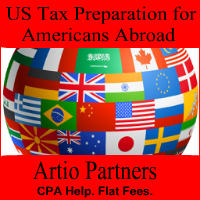 Most U.S. citizens and green card holders rushed to file a US tax return by April 15. However, Americans living abroad on the regular due date of their tax return can take advantage of several extensions.
Most U.S. citizens and green card holders rushed to file a US tax return by April 15. However, Americans living abroad on the regular due date of their tax return can take advantage of several extensions.
We updated this blog on 3/27/2020
First and foremost, American expatriates get an automatic two-month extension until June 15 to file US expatriate tax returns.
Americans who live abroad receive an automatic two-month extension. That’s because many expats have to file foreign taxes first. They can’t file their US taxes before that.
American expats must remember that this is an extension to file but not to pay.
For 2020, President Trump announced that the IRS is going to move the tax deadline in 2020 to July 15, 2020. This is a change from the previous announcement where only payments were delayed.
Normally, any tax due must be paid in full by April 15 to avoid any interest. Penalties will start to accumulate after June 15.
Taxpayers are required to attach a statement to their US tax returns with a summary of the overseas extension.
Normal Pay Date
Any normal year, taxpayers can request an additional extension for Americans living abroad until October 15 if they need more time to collect all information for US expat tax preparation. Form 4868 or Application for Automatic Extension of Time to File U.S. Individual Tax Return must be sent to the IRS by June 17. Taxpayers can do it themselves or request an expat tax preparer to send it on their behalf.

U.S. citizens and green card holders can also extend the October 15 deadline for 2 additional months. Americans living abroad must send a letter to the IRS explaining the reasons that they need more time until December 15 to complete a US tax return.
The IRS will not send any confirmation unless the request is denied. Taxpayers must send the letter by October 15 to the following address.
Internal Revenue Service Center
Austin, TX 73301-0215 USA
Americans living abroad must file form 2350 by June 17 if they expect to qualify for a physical presence test or bona fide residence test.
Exclusion
To claim the foreign earned income exclusion and foreign housing exclusion, US expats must meet one of the above tests. U.S. citizens and green card holders are taxed on their worldwide income, however, they can avoid double taxation by excluding up to $95,100 in the tax year 2012 and up to $97,600 in the tax year 2013 by applying the foreign income exclusion. The additional amount can be excluded if there are qualifying housing expenses.
FBAR
U.S. taxpayers must remember another important FBARs deadline that is June 30. FBAR is the form TD F90-22.1 or the Report of Foreign Bank and Financial Accounts.
Americans living abroad are required to file the FBAR if the aggregate value of foreign financial accounts exceeds $10,000 at any time during the year. There is no extension for the FBAR. The penalties for a failure to file the FBAR are significant and it is essential to disclose all foreign accounts. Taxpayers must send the FBAR to the Treasury Department which must be received by June 30.
We advise American expatriates to stay up to date about US tax filing requirements or to contact an expat tax CPA to assist them with US tax preparation.
Author

ZM Ishmurzina, MBA, CPA is the principal at Artio Partners. Artio Partners is a CPA firm for American expatriates living abroad and dual citizens. They specialize in past due expat tax returns and complex international tax issues like FBAR, FATCA, foreign tax credit, foreign real estate, PFIC, foreign adoption and controlled foreign corporations. For more information please visit Artio Partners
If you like this blog, subscribe to my newsletter by clicking the banner below.
I DO want to remind our readers that we appreciate any referrals you can send us. Also, please remember the GoDutch Realty agents when you talk about your home in Costa Rica, we appreciate it.

























